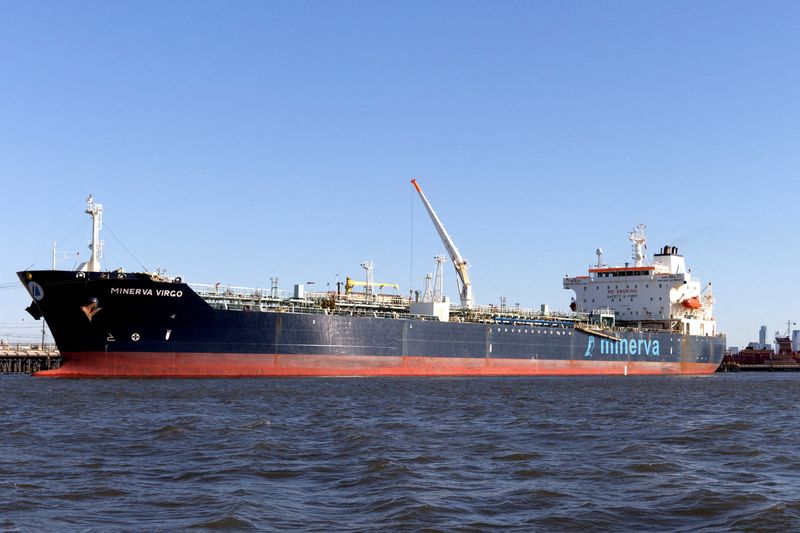By Andrea Shalal and Timothy Gardner
WASHINGTON (Reuters) - Just a month before the Group of Seven rich countries plan to cap the price of Russian oil, officials are racing to finalize details, leaving traders, shippers and insurers with questions about the price level and how it will work.
Officials from the United States and its G7 allies plan to cap prices of sea-borne oil shipments effective Dec. 5, with a second cap on oil products kicking in Feb. 5.
The unprecedented price cap aims to block Russia from profiting from high oil after its Feb. 24 invasion of Ukraine while ensuring that most of Russia's oil continues flowing to global energy markets.
India and China have been snapping up heavily discounted oil from Russia, and G7 officials hope they will use the cap to negotiate lower prices with Moscow.
Russian President Vladimir Putin has said he will stop exporting oil to countries that enforce the cap, and even if he does not, his threat could help support oil prices.
Here are the known and unknowns so far:
WHO'S IN THE PRICE CAP COALITION?
The G7 wealthy nations, the United States, Japan, Germany, Britain, France, Italy and Canada, are hammering out the plan with the EU and Australia.
Yellen last month said G7 members were not looking to broaden the coalition since none of the countries outside it were major suppliers of insurance or oil-related financial services.
Britain said Thursday it could ban countries from using its services to transport Russian oil purchased for a price exceeding the cap.
U.S. Treasury Assistant Secretary for Economic Policy Ben Harris said on Sept. 9 that if China negotiates a separate 30%-40% discount on Russian oil because of the price cap "we consider that a win."
WHAT WILL THE PRICE CAP LEVEL BE?
It will likely be weeks before the price level of the caps will be decided, government officials and analysts said.
One person familiar with the process said the cap will be determined in line with the historical average of $63-$64 a barrel, suggesting a natural upper limit.
Currently, Russian crude is priced at a discount to the international Brent benchmark and the G7 wants that discount as steep as possible to keep down Russian oil revenue. Still, requiring too wide a spread could have the unintended consequence of squeezing global supplies because Russia is the world's second largest crude exporter, after Saudi Arabia. This could raise fuel prices for Western consumers.
Hoping to prevent this, coalition officials have agreed to set a fixed price when they finalize a price cap on Russian oil later this month, rather than adopting a floating rate, sources said on Thursday.
Consensus on the cap level will be reached with the aid of a "rotating lead coordinator," the U.S. Treasury said.
HOW DOES IT IMPACT MARITIME COMPANIES?
The plan calls for participating countries to deny Western-dominated oil transport services like insurance, finance, brokering and navigation to oil cargoes priced above the cap.
Petroleum buyers would need to state they bought Russian petroleum at or below the cap.
Maritime services providers will not be held liable for false pricing information provided by buyers and sellers of Russian petroleum, the U.S. Treasury said.
G7 officials believe the plan will work because the London-based International Group of Protection & Indemnity Clubs insure about 95% of the global oil shipping fleet.
HOW COULD RUSSIA FIGHT BACK?
Putin has vowed to cut exports to countries that participate in the cap, but he also needs oil revenues to help fund Moscow's war efforts.
Industry players estimate that 80% to 90% of Russian oil can flow outside the cap mechanism using Russian and other non-Western ships and insurance.
In October, JP Morgan estimated that Russia is short about 1 million barrels of daily tanker capacity for shipping crude and 2.5 million barrels short on fuels capacity. Moscow could end up cutting production as a result, which would apply upward pressure on global oil prices. Prices could rise even if traders fear Putin will stop exports.
Some analysts say Moscow also could withhold oil from Russian assets in other producing countries such as Libya and Iraq.
HOW WILL THE CAP BE ENFORCED?
The plan lacks a centralized enforcement mechanism leaving it up to countries implementing the cap to apply punishments for purchases above the cap.
The U.S. Treasury warned service companies to watch for potential evasion or fraud by Russian oil buyers. Those could include evidence of deceptive shipping practices, refusal to provide requested price information, or excessively high services costs.
Anyone who falsifies documentation or otherwise hides the true origin or price of Russian oil would face consequences under the domestic law of jurisdictions implementing the price cap, Treasury said.
The coalition has agreed the price cap will apply through the first landed sale of sea-borne oil, or when the oil is offloaded from a ship to a tank on land. This means any intermediary trades while the oil is at sea must be at or under the cap, a Western source said on Friday.

Some industry players worry that owners of tankers could face sanctions, noting the United States has no mechanism to determine what due diligence was undertaken.
Worries about potential sanctions, even if unfounded, can cause traders to avoid deals, another factor that can boost oil prices.